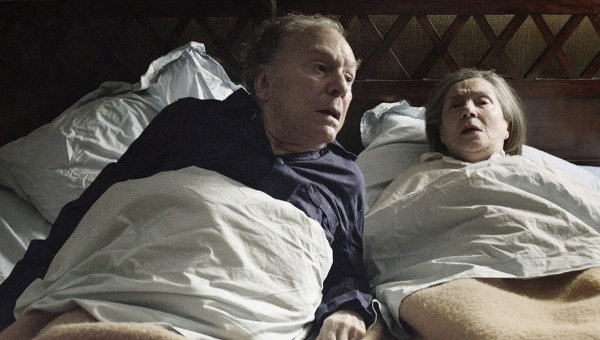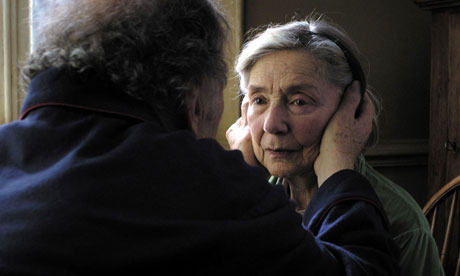
WHEN we think of Michael Haneke we cannot help but think ‘disturbing’, ‘frightening’, ‘chaotic’ or ‘disordered’, ‘dark’ and even perhaps ‘evil.’ I am thinking of Benny’s Video, The Piano Teacher, Hidden, The White Ribbon, Funny Games. This is why I was a little surprised with ‘Amour’ which I saw at the Nova tonight. Nothing really remotely frightening or disturbing, or evil for that matter- perhaps a little dark but nothing to jolt or shock the average filmgoer- well, perhaps one scene near the end, which we have seen before in ‘Betty Blue’ and ‘One Flew Over The Cuckoo’s Nest’, involving a strategically placed pillow.
The old couple, Georges and Annie, are quite lovely. They have an authentic old people’s relationship, where there is still love, but everything is faded, much like the elderly couple in Elizabeth Jennings’ poem ‘One Flesh.’ One day Annie stares into space whilst Georges is talking to her, and cannot remember having a wet towel administered to her in attempt to jolt her back to her senses. Her health deteriorates after a series of strokes, and she becomes paralysed all the way down one side, and totally dependent upon her husband for help with walking, toileting, washing, feeding, etc. When a nurse demonstrates how to attach a ‘diaper’, the look on Annie’s face is one of despair, of bare acceptance, staring her mortality in the face. She makes him promise she will never end her days in a hospital, and he does his best, but the constant grim grind is exhausting and debilitating. In the end Georges starts to lose his mind.

Just about the whole film is set within the confines of their lovely, spacious Parisian apartment. The camera tracks lovingly across the surfaces of its rooms. There is something real and convincing about the way the whole drama is played out. We watch and flinch sometimes because we know it will probably happen to us. The way it is so truthful is its biggest strength, a kind of opposite to the farce that was another French film on a similar topic, ‘The Intouchables’. Haneke has pared back the scary challenging nature of his themes for this one, which is why it is probably more palatable to Western audiences, even winning the Oscar for Best Foreign film.
There are a lot of examples of Haneke’s customary stillness- long, lovely shots full of meaning- a long still of an expectant audience awaiting an orchestral recital- full screen images of a brief series of paintings- thought provoking imagery, such as when Georges cut the flowers off a series of stems. There were three occasions when he let water run freely from the kitchen tap.

Occasionally someone from the outside came to visit the apartment, but most of the time the couple alone were enough to interest us, inhabiting their space in complex ways. It wasn’t claustrophobic- the spaces within the apartment are huge- but the drama is played out between them and for them alone- even siblings (Isabelle Huppert) are like outsiders, and friends and carers are either tolerated or not.
I now realise that I said earlier that there is nothing in this film that is overly shocking. This is interesting because I must have clearly come to a point in my thinking that it is perfectly reasonable and understanding that a man might kill his wife if he thinks she is suffering. I am not 80 years old or older. I cannot fully appreciate the dilemma that was in George’s mind. And yet, many of us, seeing Annie’s tortured despair in lifting her buttocks for the nurse to administer a diaper, would fully appreciate his kind and brave decision.

No comments:
Post a Comment